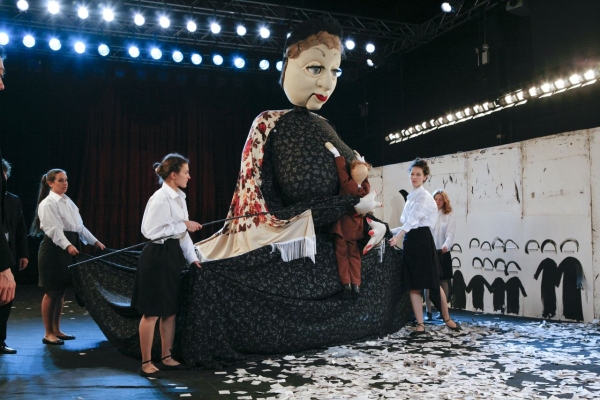Opus No. 7

(© Pavel Antonov)
In a month as bleak as January it wouldn't normally be advisable to take in a play about the Holocaust and then chase it with one concerning the persecution of artists under the Soviet Union. However, Russian director Dmitry Krymov has taken these two supremely depressing subjects and turned them into beautiful and engaging theater. His Opus No. 7, a double-bill of independent one-acts at St Ann's Warehouse, is a must-see for aficionados of strange and unusual stage works or anyone who likes to see the actors and stage crew really sweat it out.
The first part, "Geneology" tells the story of Russia's disappeared Jews. The actors splash black paint on a gnarled white cardboard wall upstage and decorate the splotches with yarmulkes and curlicue hair. They cut around these Hasidic silhouettes with box cutters and from the ensuing void explodes thousands of shreds of Russian newspaper, coating the stage and snowing down on the audience. While all of this is breathtaking, it doesn't tell the story nearly as well as the hundreds of empty children's shoes that pour out of a chute on stage and are arranged in a line by the actors.
One would expect something visually arresting from a performance group that styles itself the "theater of painters," and the Krymov Lab does not disappoint. In fact, the visual storytelling and design are so clear, the English supertitles projected over the stage seem like an extravagance. Luckily, they are rarely utilized and get their greatest workout in the second part, "Shostakovich," when they translate a speech by Russian composer Dmitri Shostakovich extolling the virtues of Soviet Realism.
Of course, Shostakovich is in store for a Soviet reality check. The second part is completely devoted to telling the story of his life as an artist both acclaimed and denounced in the Soviet Union. Throughout, he is dually coddled and hounded by a gigantic babushka puppet, the personification of "Mother Russia."
"Shostakovich" begins with a child-like version of the composer naughtily climbing into an under-construction piano. While the precocious composer is at first applauded by Mother Russia, he soon discovers that this acclaim comes with major drawbacks, like when he is impaled with a giant Soviet Award badge. Shostakovich is the only survivor when Mother Russia summarily executes all of his artist friends (including the experimental theater director Vsevolod Meyerhold) in a jaunty ballet of death.
The soundscape for the second act is all up-tempo Shostakovich and even though brutal, dictatorial things are happening like artist purges and domestic surveillance, you cannot help but tap your toes to the music. By the end, Shostakovich is a hollow and withered creature, a puppet clinging to the bosom of Mother Russia.
The diminutive and fun-to-watch Anna Sinyakina plays Shostakovich like a messy toddler.. This is not "gender-blind" casting, but rather a conscious choice to depict the composer as a clownish little boy. (No one plays little boys better than tiny women. Just ask Cathy Rigby.) The other standout performance comes from the stony-faced Mikhail Umanets who uses his deep baritone to incant brief and inglorious obituaries for the dead in the first part and then gives us the creeps as a Soviet operative in the second part. His arrival onstage usually means bad news and he is excellent at making us shift in our seats with very little effort.
But beyond the theatrical perils of scripted plot, Krymov has succeeded in endowing the stage with a sense of real and present danger (mostly relating to pianos). Dull-eyed Soviet workers build a grand piano live on stage, cutting the wood without any safety glasses. Flames leap out of the piano in Shostakovich's apartment, threatening to singe his wild hair. The actors ram rusty metal piano frames into each other in a demolition derby of classical music. Everything about this play feels physically unsafe and was more than a little reminiscent of the work of Lithuanian director Eimuntas Nekrosius, who once famously hung a rusty rotary saw over the stage in his production of Hamlet. It made me wonder, would Equity smile upon a similar production with American actors?
We won't know the answer until the American versions of Krymov and Nekrosius show up and make it happen. Until then, you'll just have to see this beguiling and visually stunning play from Moscow: it is uncommon, ambitious and just a little bit scary.











